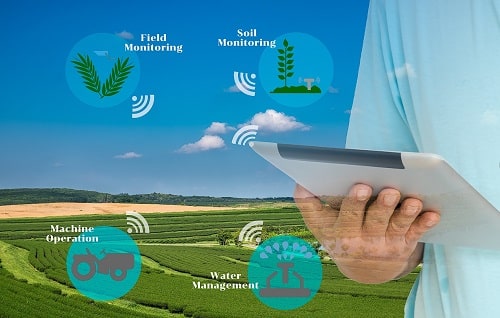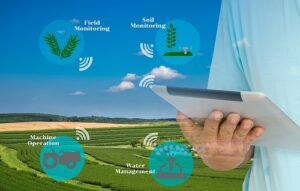Agriculture has always been an essential sector of the economy, providing food for the world’s population. With the advent of technology and the internet, the agriculture sector has started to leverage big data analytics to enhance its productivity and efficiency. This article delves into the opportunities and challenges of big data in agriculture.
What is big data in agriculture?
Big data in agriculture refers to the collection, analysis, and utilization of vast amounts of data to improve farming practices. This includes data from weather patterns, soil characteristics, crop yields, and machinery performance. The data can be analyzed to provide insights into the most efficient and profitable farming practices, such as optimizing irrigation, seed selection, and crop management.
Opportunities of big data in agriculture

Precision farming
One of the most significant opportunities of big data in agriculture is precision farming. Precision farming involves the use of data to tailor farming practices to individual crops or fields. For example, farmers can use big data to determine the optimal planting times for their crops, as well as the right amount of water and fertilizer to use. This helps to reduce waste and increase yields, leading to higher profits.
Predictive analytics
Big data in agriculture can also be used for predictive analytics. Predictive analytics involves using historical data to predict future outcomes. For example, farmers can use big data to predict crop yields based on weather patterns and soil characteristics. This helps farmers to plan their harvests more efficiently and effectively.
Supply chain optimization
Big data in agriculture can also be used to optimize the supply chain. By collecting and analyzing data on crop yields, weather patterns, and transportation costs, farmers can optimize the distribution of their products. This helps to reduce waste and increase profits for both farmers and distributors.
Challenges of big data in agriculture
Data quality
One of the most significant challenges of big data in agriculture is data quality. The accuracy and completeness of the data can significantly impact the results of the analysis. Farmers must ensure that the data they collect is accurate and relevant to their needs.
Data privacy
Data privacy is also a significant challenge for big data in agriculture. Farmers must ensure that they collect and use data ethically and with the necessary permissions. They must also protect the data from cyber threats, such as hacking or data breaches.
Infrastructure
The infrastructure required to support big data in agriculture can also be a challenge. Farmers must have access to reliable internet and computing resources to collect, store, and analyze the data. This can be challenging in rural areas, where internet access may be limited.
Conclusion
Big data in agriculture has the potential to transform the industry by providing insights into the most efficient and profitable farming practices. However, to fully realize the benefits of big data in agriculture, farmers must overcome the challenges of data quality, data privacy, and infrastructure. Additionally, farmers must ensure that they collect and use data ethically and with the necessary permissions. With careful planning and investment, big data in agriculture can lead to increased yields, reduced waste, and improved sustainability.
FAQ
What are the benefits of big data in agriculture?
Big data in agriculture can provide several benefits, including precision farming, predictive analytics, and supply chain optimization. By using data analytics to optimize farming practices, farmers can increase yields, reduce waste, and boost profits.
What are the challenges of big data in agriculture?
The challenges of big data in agriculture include data quality, data privacy, and infrastructure. Farmers must ensure that the data they collect is accurate and relevant to their needs. They must also collect and use data ethically and with the necessary permissions, and they must have access to reliable internet and computing resources.
How can farmers overcome the challenges of big data in agriculture?
To overcome the challenges of big data in agriculture, farmers must ensure that they collect and use data ethically and with the necessary permissions. They must also protect the data from cyber threats and ensure that the data they collect is accurate and relevant to their needs. To address infrastructure challenges, farmers may need to invest in technology, such as high-speed internet and computing resources. Additionally, farmers may need to seek out partnerships with technology companies or government agencies to improve access to infrastructure.
How can big data in agriculture benefit the environment?
Big data in agriculture can benefit the environment by reducing waste and improving sustainability. Precision farming, for example, can help farmers optimize their use of resources such as water and fertilizer, reducing the impact of farming practices on the environment. Additionally, big data can be used to identify and address environmental issues such as soil erosion and nutrient depletion.
Are there any ethical concerns with big data in agriculture?
Yes, there are ethical concerns with big data in agriculture. Farmers must ensure that they collect and use data ethically and with the necessary permissions. This includes protecting the privacy of individuals who may be impacted by the data collection and analysis. Additionally, farmers must consider the potential impact of their data collection and analysis on the environment and society as a whole.
What is the future of big data in agriculture?
The future of big data in agriculture looks promising. As technology continues to advance, the amount and quality of data available to farmers will only increase. Additionally, as more farmers adopt big data analytics, there will likely be an increase in collaboration and data sharing, leading to further improvements in farming practices and sustainability.
